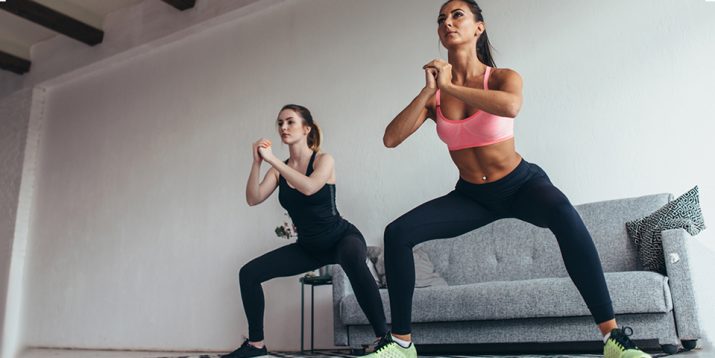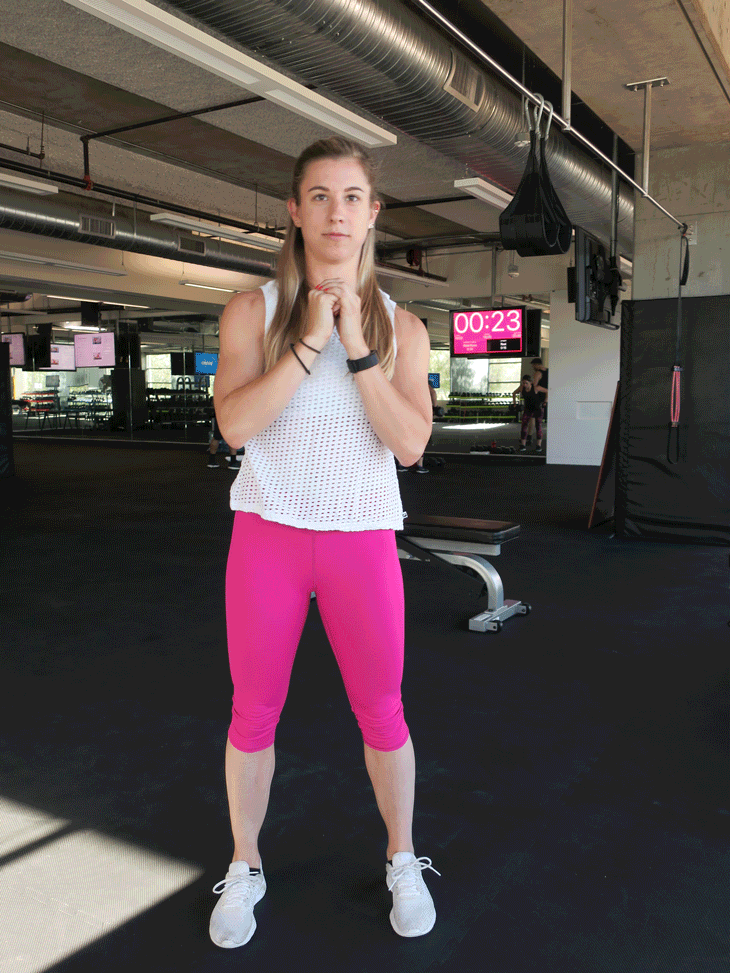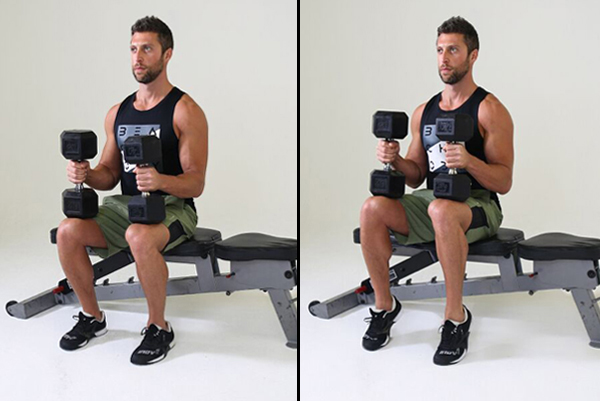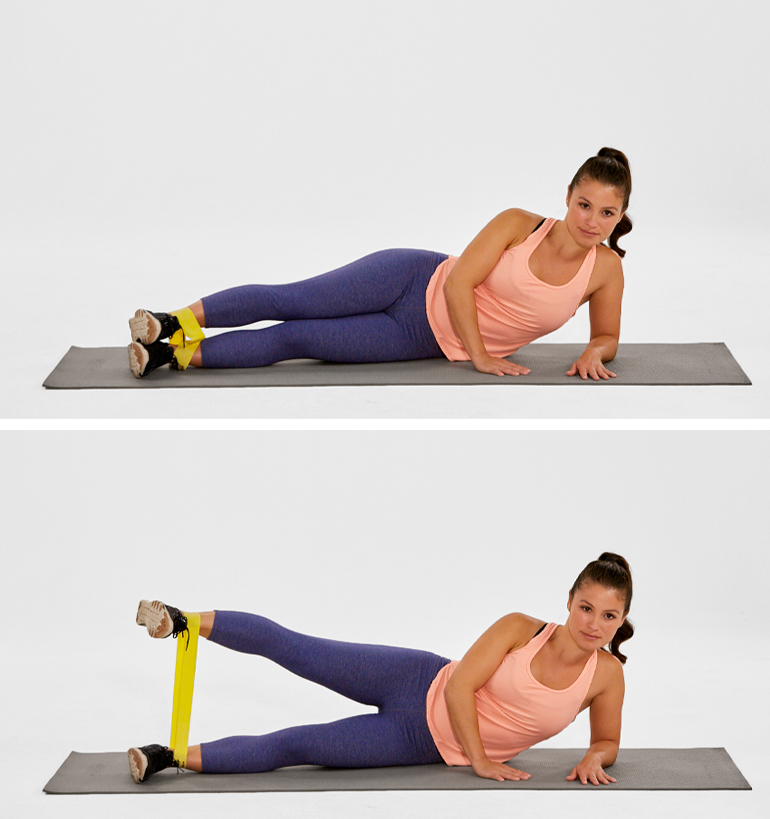15 Exercises to Add to Your Lower-Body Workout

Every body needs a strong foundation. That’s why you should regularly include lower-body exercises in your workout routine, says sports performance coach Cody Braun, CPT.
Lower body exercises can be highly effective at improving overall fitness, and incorporating movements such as squats and lunges can help shape and strengthen the lower-body muscles.
Moreover, adding weights to lower body exercises can increase the intensity of your workouts and provide an additional challenge for those looking to build muscle and endurance.
And for those who prefer to exercise at home, there are many effective lower-body exercises performed without weights, such as bodyweight squats and lunges, that can be incorporated into a daily fitness routine.
Ready to get in your best lower-body workout ever? Mix and match the moves below and get started!
1. Dumbbell Squat
Program: Strong + Solid With Lita Lewis
- Stand with your feet hip to shoulder-width apart, holding a pair of dumbbells at arm’s length by your sides.
- Keeping your back flat, chest up, and core braced, push your hips back, bend your knees, and lower your body until your thighs are parallel to the floor.
- Pause, then push yourself back up to the starting position.
2. Dumbbell Goblet Squat
- Hold a dumbbell vertically in front of your chest, cupping the top end in both hands. Stand with your feet hip- to shoulder-width apart.
- Keeping your back flat and elbows pointed down, push your hips back and lower your body until your thighs are at least parallel to the ground.
- Pause, and then slowly push yourself back up to the starting position.
3. Bulgarian Split Squat
- Stand facing away from a bench, holding a pair of dumbbells at arm’s length by your sides. Place the toes of your left foot on the bench behind you.
- Keeping your torso upright and your core engaged, lower your body until your right thigh is parallel to the ground.
- Pause, and then push back up to the starting position. Do equal reps on both legs.
4. Lateral Lunge (or Side Lunge)
Program: Shift Shop
- Stand tall with your feet hip-width apart holding a pair of dumbbells at arm’s length by your sides, palms in.
- Keeping your right leg straight and right foot on the floor, step to the left side with your left leg, then push your hips back as you bend your left knee. Lower the weights on either side of your left knee until your left thigh is parallel to the floor.
- Pause, and then push yourself back up to the starting position.
5. Glute Bridge
Program: Abs + Booty Burn With Jordan Morrello
- Lie on your back, arms down by your sides. Bend your knees and plant your feet flat on the floor.
- Pull in through your navel to brace your core muscles and then squeeze your glutes to press your hips up so your body forms a straight line — no arching — from knees to shoulders.
- Keep your head on the floor and eyes focused on the ceiling.
- Hold the position for a beat, and then lower and lift, and repeat.
6. Camel
Program: 80 Day Obsession
- From a kneeling position, with your butt resting on your heels and the tops of your feet on the floor, hold a heavy dumbbell at your chest with both hands.
- Keeping your chest up, shoulders back, and core engaged, squeeze your glutes as you push your hips forward to full extension, shifting your weight onto your knees.
- Pushing your hips back, slowly lower your butt back down onto your heels, and repeat for reps.
7. Single-Leg Hinge With Loop
Program: 80 Day Obsession
- Loop a resistance band around your left foot, and grip it with your right hand as you rise up to stand up straight with your feet hip-width apart and your knees slightly bent.
- Keeping your back flat, your core engaged, and your left knee slightly bent, raise your right leg off the floor a few inches and hinge forward at your hips until your torso is as close to parallel with the floor as possible. (As you lower, your right leg kicks back.) Your right hand should lower down as it holds the band, and your left arm can be out to the side for balance.
- Return to a single-leg standing position and repeat the move, completing all reps on your left leg before switching sides.
8. Forward Lunge
- Stand tall holding a pair of dumbbells at arm’s length by your sides (palms in) with your feet hip-width apart.
- Keeping your chest up, shoulders back, core braced (imagine someone is about to hit you in the gut), and back flat, take a large step forward with your right foot. Lower your body until your front thigh is parallel to the ground and your rear knee is bent 90 degrees (it should hover a couple of inches above the floor).
- Pause, and then reverse the movement to return to the starting position. Repeat, this time stepping forward with your left foot. Continue alternating legs with each rep.
9. Reverse Lunge
Program: Tough Mudder T-MINUS 30
- Stand with your feet hip-width apart holding a pair of dumbbells at your sides.
- Keeping your chest up and your core engaged, take a large step backward with your right foot.
- Slowly lower your body until your left thigh is parallel with the floor and your right knee is bent 90 degrees, just above the floor.
- Pause and, pushing forcefully off your left foot, reverse the movement, taking a large step forward to return to the starting position.
- After you’ve completed your set, switch sides, performing equal reps on each leg.
10. Curtsy Lunge

- Stand with your feet hip-width apart. If you use a weight, hold it in front of your chest, as you did with the goblet squat.
- Keeping your back flat and your core engaged, step your left foot behind and outside your right foot, lowering your hips until your right thigh is parallel with the floor, lowering the weight as you step your left foot behind you. Your left knee should hover an inch or two above the floor.
- Reverse the movement to return to the starting position. Continue for reps, then switch sides and repeat.
11. Clamshell
- Lie on your right side with your feet and hips stacked, your knees bent 90 degrees, and your head resting on your right arm.
- Draw your knees in toward your body until your feet are in line with your butt. Place your left hand on your left hip to ensure it doesn’t tilt backward. This is your starting position.
- Keeping your abs engaged and your feet together, raise your left knee as high as you can while keeping your feet together and your right hip on the floor.
- Hold for 1 second, squeezing your glutes at the top of the move, before slowly lowering your left knee to the starting position.
- Perform equal reps on the other side.
12. Standing Calf Raise on Elevated Surface
- Holding a dumbbell in your left hand, stand with the ball of your left foot on an elevated surface, with your left heel hanging off.
- Keeping your core engaged, raise your left heel as high as possible.
- Slowly lower your heel down onto the raised surface until you feel a stretch in your calf.
- Repeat and do equal reps on both legs.
13. Seated Calf Raise

- Sit tall on a bench or chair with your feet flat on the ground holding two heavy dumbbells on top of your knees.
- Keeping your core engaged, lift your heels off the ground as high as possible.
- Slowly lower your heels back down to the ground, and repeat.
14. Step-Up
- Stand tall holding a pair of dumbbells at arm’s length by your sides, and place your left foot on a bench so that your hip, knee, and ankle are all bent 90 degrees.
- Keeping your chest up and shoulders back, push your body up with your left leg until it’s straight (keep your right foot elevated).
- Pause, and then lower your body back to the starting position under control. Perform equal reps on both legs.
15. Side Leg Lift With Band

- Wrap a resistance loop around your ankles and lie on your right side, propping yourself up on your right forearm.
- Keep your legs straight and stacked on top of each other and your toes pointed forward.
- Lift the top leg, lower, and repeat.
- Do equal reps on both sides.
How to Design the Best Lower-Body Workout
To create an effective lower-body workout routine, start with your biggest muscle groups.
- Choose any moves you like, but begin with compound (multi-joint) and bilateral (working both sides of your body) exercises that hit your glutes, quadriceps, and hamstrings.
- Include a mix of the big three lower-body movement patterns (squats, hip hinges, and lunges). This trio also builds functional strength so you can to perform day-to-day feats of strength, like making it through your final round of squats or climbing the stairs while carrying your groceries.
- Then do single-joint and unilateral exercises that target specific muscle groups or have elements of instability. These additional lower-body exercises strengthen the hip abductors (outer hips), adductors (inner thighs), and calves.
This approach, of hitting each movement pattern or muscle group equally, will help prevent muscular imbalances to keep your lower body healthy and injury-free.
How Often Should You Work Out Your Lower Body?
Try not to go more than three days without training your lower body. You can do variations of these lower-body movements in a single workout or spread them throughout the week, Braun says.
While it depends on your goals, you should “do lower-body exercises a minimum of twice per week, or up to four times a week,” he says. Just avoid working the same muscle group on back-to-back days.
Braun offers these extra tips for scheduling your lower-body workouts:
- To allow adequate recovery between workouts, go with split routines, which work different muscle groups on different days.
- For example, train your lower body on Monday, do upper-body pushing patterns on Tuesday, train the lower body again on Wednesday, and then do upper-body pulling patterns on Thursday.
- Short on time? Aim for two to three total-body workouts per week (that combine upper-body and lower-body exercises). This ensures you’re working your lower body frequently enough to effectively strengthen your muscles.
What Weights Should You Use for Lower-Body Exercises?
The right weight for lower-body exercises will be different for everyone.
Use a combination of moderate to heavy weights for 3-4 sets of 6-12 reps, and light to moderate weights for 3-4 sets of 12-20 reps.
Ideally, you should finish your last set of each exercise unable to perform any extra reps. Reaching this level of fatigue will help you build strength, muscle size, and endurance. This applies no matter how often you do lower-body workouts.
